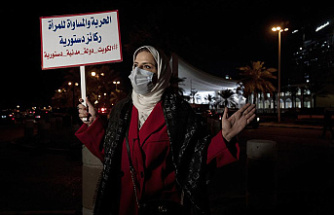This marked the end of the first phase in a historic six-month-long operation to resettle Afghans who were left vulnerable following the sudden collapse of the U.S.-aligned government.
As part of the largest U.S. resettlement effort In decades, the Biden administration created a network at U.S. military bases abroad and throughout the U.S. to quickly process tens to thousands of Afghans who were considered to be at high risk in Taliban-controlled Afghanistan.
U.S. officials used "lilypads" at military bases overseas to vet and process Afghans who were airlifted from Kabul last year. They also set up eight temporary housing facilities known as "safe havens," which are located at domestic bases, to provide contagious disease vaccinations and complete resettlement processing.
The U.S. slowly closed its domestic military processing sites, as it worked with private citizens and non-profit agencies to resettle Afghans within more than 200 communities throughout the country.
The remaining evacuees housed at Joint Base McGuire-Dix-Lakehurst, New Jersey -- the last of the safe havens to wind down operations -- departed the site on Saturday morning, joining 76,000 Afghans who have relocated to their new communities in the U.S., the Department of Homeland Security (DHS) announced.
Bob Fenton (a long-serving Federal Emergency Management Agency official) was selected to oversee inter-agency Afghan resettlement efforts. He called it the largest government operation.
Fenton stated that FEMA has been his employer for 25 years and has helped with disasters. "This is by far the most complicated and largest event I have been involved in. From evacuating 85,000 people across the globe into 10 military bases in Europe and the Mideast, to then eight bases here in America, it was a complex and large-scale operation."
Eight facilities were available at U.S. military bases and offered evacuees halal meals, faith-based services and English language instruction. They also provided assistance with immigration paperwork and medical services for medevaced and pregnant women.
Fenton stated that domestic housing sites were set up at six US military bases and Air Force installations. They also provide recreation and schooling for children.
Fenton stated, "Think of running eight small towns." "Everything that goes along with a small city we had to provide a very vulnerable population."
According to CBS News unpublished statistics, more than half of the Afghans who were processed at the domestic bases -- or 35,128 refugees -- have been resettled in Texas and California, Virginia, Washington.
Colorado, Massachusetts and Maryland have all received 21331 evacuees. They resettling over 1,000 people each. South Dakota, Mississippi and West Virginia have all resettled 22 Afghans, while Wyoming is the state that is unlikely to receive evacuees.
Ali Noorani, President of the National Immigration Forum, stated that "I believe the greatest lesson for the Administration to take away from the operation is that the American people are overwhelmingly in favor of immigrants and refugees being part of their communities."
"The children are very happy"
Ahmad Zaki Babakarkhil claimed he worked in Afghanistan at an American military base before the Taliban tookover. He lived with his wife and their three children at Fort Pickett in Virginia for several months.
The family of evacuees is currently living in an apartment in northern Virginia that has been listed by Airbnb. This program was created to help Afghans find temporary homes. Babakarkhil stated that his family has only left their temporary home to go grocery shopping. He said that they have felt safe and secure in Alexandria.
Babakarkhil, an interpreter for CBS News, said that the children were very happy in Pakistan. The parents in Afghanistan were not available to the children. The children often say that they wish their parents were there from the beginning when they go for walks or play in the park.
Timothy Young, spokesperson for Lutheran Immigration and Refugee Service (a faith-based organization that is helping Babakarkhil and their family members to settle in America), said that a lease was signed recently for permanent housing and that the family should be able move into the area within the next few days.
Babakarkhil stated that he hopes to enroll the children in school as soon as they are able to move in. He also plans to learn new skills in order to get a job with a U.S. work permit.
Babakarkhil expressed concern over the uncertainty surrounding his family's legal status.
Babakarkhil and his family arrived in the U.S. through a temporary humanitarian program called parole. This is not the refugee process which can take years. Although it allows them to legally work and live in the U.S., parole does not allow them to become permanent residents.
U.S. officials determined that some Afghans can be granted permanent residency because they or their immediate families aided in the American war effort. However, at least 36,000 evacuees do not have a path to permanent status and are left in legal limbo unless Congress legalizes or they are granted asylum.
Fenton, the DHS official who coordinated the resettlement operation, asked Congress to approve the Afghan Adjustment Act. This would allow evacuees directly to apply for permanent residence, bypassing the asylum program which has a backlog with 412,000 unresolved case.
He called the Afghans who were brought to the U.S. by the Americans last year "special," noting that many of them had worked with American forces during the 20-year conflict in Afghanistan.
Fenton stated that Americans must accept them in, assist them with their integration and welcome them to the United States.
DHS officials stated that while the domestic bases' evacuee sites have been demobilized they are still working to establish a non-military processing center in the U.S. to handle future Afghan arrivals. According to the most recent DHS figures, 2,800 Afghans are still being processed at U.S. bases in the United Arab Emirates and Qatar .
Over 43,000 humanitarian parole applications from Afghans or third-country hopefuls to enter the United States have been received by the U.S. According to U.S., U.S. officials denied 90% of these parole requests, and only 1,700 of those parole applications were approved. Data from Citizenship and Immigration Services (USCIS).
Krish O'Mara Vignarajah of the Lutheran Immigration and Refugee Service stated that each of the 40,000 cases represents a family seeking reunification or a life in danger. "The administration must stand by its word and act quickly to process these applications," she said.











